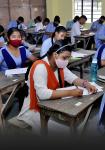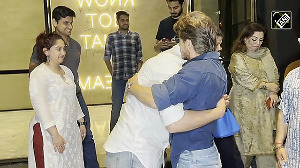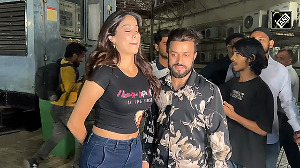It is always difficult to answer a question like what I would have done today if I were the Finance Minister. It is like asking a doctor to treat a patient after other doctors have failed and the condition of the patient has deteriorated.
I am saying this because we had left an economy in fine fettle when we had demitted office in May 2004. Thus if some short and long term problems are afflicting the economy today, they are clearly the products of the last four years.
The most important achievement of the NDA regime was the breaking of the vicious cycle of high inflation, high interest rates and low growth, which had been a feature of the Indian economy in the past, and replacing it by the virtuous cycle of low inflation, moderate interest rates and high growth.
Unfortunately, we seem to have returned to the old days of high inflation and high interest rates. Growth has held so far but there are clear signs of the economy slowing down. Added to this is the problem of exchange rate management and monetary policy.
The demand for essential commodities is inelastic and a tight money policy will not succeed in reducing their demand. But a tight money policy will surely impact adversely on consumer goods, housing and investment demand, which have been the drivers of the economy.
High interest rates are also attracting larger inflows of foreign capital, leading to further appreciation in the value of the rupee against the US dollar. This in turn is affecting our exports adversely and increasing money supply leading to further inflationary pressures. In this background, the Budget which I would have presented would have concentrated on the following:
My first task would have been to curb inflation. For this I would have taken a number of steps on the supply side to flood the market with commodities which are in demand, specially essential commodities.
I would have replaced the minimum support price with a procurement price for wheat, rice and other produce so that our stocks were sufficient to influence market prices through the public distribution system.
If this added to the burden of subsidies it could have been shared between government and the consumer. The very fact that government godowns are full would have a sobering influence on prices. The same could apply to edible oils.
I would have invited the farmers to replace the loans they have taken from private moneylenders with loans from public financial institutions. Some may misuse this facility for fresh loans from the banks, but it is a risk worth taking.
I would have also remitted the interest charges on all farmers' loans which were in excess of the principal amount. I would have also given debt relief to all small and marginal farmers up to a principal amount not exceeding Rs 25,000 along with the interest on it and covered all loans including those from cooperative banks and regional rural banks.
In my Budget I would have laid down that all central schemes to be executed by State Governments in the area of agriculture, health, education and employment generation would be funded 100 per cent by the Government of India. All partially funded schemes would be transferred to the State Governments along with the Government of India's financial contribution. Thus the number of central schemes would be drastically reduced and only the very important schemes would be retained in the central sector.
I would also announce the launch of a Sampoorna Sinchai Yojana as a central scheme on the lines of the Pradhan Mantri Gram Sadak Yojana, that all our fields could be covered by irrigation within a period of five years. Small irrigation schemes and medium irrigation schemes could be implemented and run by Pani Panchayats of the beneficiaries.
Rural infrastructure, like rural roads, cold chains and other storage facilities would have been given top priority by me. Freedom of marketing and liberation from the existing marketing laws would have been a priority too.
I would have given all encouragement to micro-finance and SHGs. Women and unemployed youth in the rural areas could be given training to develop technical, managerial and entrepreneurial skills to take the fullest advantage of this opportunity.
Similarly, scholarships would be given to youth below the poverty line for job-oriented training to enable the youth to take advantage of modern-day job opportunities.
I would have encouraged the private sector to open more higher and technical educational institutions by giving them attractive tax breaks.
On the tax front I would have raised the exemption limit of personal income tax to Rs 150,000, and recast the slabs as follows: Rs 150,000 to Rs 500,000 - 10 per cent; Rs 300,000 to Rs 10,00,000 - 20 pper cent and Rs 10,00,000 and above 30 per cent.
I would have abolished all surcharges. I would have also raised the income tax relief on interest on housing loans from the present Rs 150,000 to Rs 200,000, in view of the rising EMI cost.
I would have reduced the peak customs duty by 2.5 per cent and taken steps to eliminate the inverted duty structure wherever it existed. I would have reduced the mean rate of cenvat from the existing 16 per cent to 14 per cent across the board, done away with all product-specific rates and removed discretionary powers at all levels.
Service tax rates would have been raised to 14 per cent from the present 12 per cent to match the cenvat rate, which would have been the first step towards the introduction of GST.
I would have clearly spelt out the road map for the introduction of GST from the next year. I would abolish the fringe benefit tax and the banking cash transaction tax.
I would have combined all subsidies which benefit individuals specially those below the poverty line and paid them directly to the bank account of the individual beneficiary. Banking can now be taken to the door step of the individual through hand-held devices. This would eliminate all sarkari middlemen in these schemes.
Infrastructure is a crying need. PPP is fine but I would have set up a large number of government-owned SPVs to take up specific infrastructure projects which are financially viable.
I would have deepened economic reforms by completing the pending second-generation reforms like pensions, insurance, banking, capital markets, foreign exchange liberalisation and electricity sector reforms. I would have launched the third generation of economic reforms like labour market reforms, administrative and judicial reforms and land and land use reforms.
At the same time the fiscal balance of the Budget would have been maintained by reducing wasteful expenditure.
The author was Union finance minister, first in 1990-91 and then in 1998-2002







 © 2025
© 2025